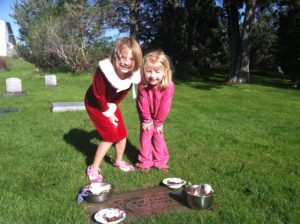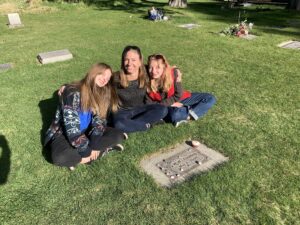This one is my ode to grief. Originally published by Hip Mama, 2018
Hip Mama published one of my early essays, 15 years prior, about this same life experience. Feels extra appropriate that they chose to publish this one, too.

Baking Cupcakes for the Dead
Fifteen years ago, my first baby was born prematurely and died at the hospital. Every year, a tidal wave of grief washes over me on that anniversary. The wave is a physical phenomenon, a bodily memory of trauma that supersedes everything in my life for a while. I see it coming and know it won’t last forever, but also know I cannot stop it from arriving. Every spring for fourteen springs, the grief wave has built, crested, crashed, receded.
The first few years, the wave took me down. A week, maybe two, underwater, leaden and drowning, until I spit onto shore, exhausted, resentful, dissatisfied. I couldn’t break free of suffering. No one understood. The grief wave was traumatic and awful—most of all, lonely. Everyone else forgot, moved on. They thought I should too. But I couldn’t.
Years passed. Time and therapy helped bring peace to loss. My pregnancy had been a train-wreck, months of stress and medical intervention. Eventually, everything fell apart. But it wasn’t my fault. What happened was terribly sad, but didn’t have to define me. I had two beautiful healthy daughters after. My life today is rich with complex, messy, real-life love. I don’t dwell on losing my son anymore. When I think of him, it’s with tenderness and gratitude. I’m a better person because he taught me to touch the void, and come back.
But still. The grief wave comes. A few weeks before the day of his death, I begin to remember. Days warm, flowers bloom, spring arrives. Memories of those last weeks with him inside me return. Sensations stir from deep within, born from the body, not the mind.
The date looms on the calendar. There is no fear or sadness, not yet. From this distance, I observe. I have become a student of grief. Will the grief wave come again? Rationally, I imagine this year the wave won’t be as strong. Maybe it won’t come at all.
Then the tide rises. I am losing control. This, once more. I’m emotional. All the songs on the radio make me cry. I’m vulnerable. I want my husband to hug me 160 times a day. I’m distracted. I leave the house without putting away the milk. I’m disconnected. People talk but I don’t know what they say. I’m irritable. I don’t know what to do next, or why it matters. I just want to curl up in a ball in the corner with the cats.
The mind has reasoned, deconstructed, made peace. But the body remembers.
I resist. Even though resisting is futile, I resist. Who wants to feel this sad? Yet the calendar marches relentlessly towards the day. The weight of matter upsurges. The pressure on my chest—this is heartache. Grief pricks under my skin. I cry in yoga, I cry in the car, I cry in the office. I don’t let anyone see, though, because I’ve never been able to explain the grief wave in a way that satisfied anyone.
You have so many blessings, I remind myself. What happened to you is not the same as your friend Daniel who lost his daughter to cancer or your friend René who lost her husband to suicide. I hear things people have said out loud to me: You should be over this.
But I know I am not the only one to carry the anniversary of loss in my bones. I am not alone. I’ve seen a grief wave in René each November, in Daniel each March.
Here’s what I have learned: dodging the grief wave is not only impossible; it’s detrimental. The grief wave must be let in. The wave has to wash over me in order to rush by me. Accommodating the memory of pain and accepting its annual entrance into my life is the only way to the other side.
I’ve also learned the grief wave is temporary. It must be. Even at its very worst, the wave didn’t last. After all, real life calls. I have a story deadline. My husband asks me to pick up eggs. My daughter wants me to listen to a new song. My other daughter needs me to braid her hair. My children will not allow me to curl up in a ball in the corner with the cats. That was never their plan for me, no matter the day of the year. As it turns out, parenting the living is much more demanding than parenting the dead.
The wonderful calamitousness of my living, breathing family hauls me in from the deep. My husband does hug me 160 times a day. My children drag me above the water line. Not only in their unceasing reminders that I am needed in the here and now, not only that their very existence represents my blessings, but in the way, come that significant day on the calendar, that my daughters insist on a very real acknowledgement of the brother they never met.
He has never been a secret to them. The day my baby died was also the day he was born, and that is what we celebrate. We bake cupcakes and take them to his grave. Every year of their lives, my daughters have visited the cemetery. In this way, unwittingly, they grew into the exact companions I needed for this day. To them, their brother’s birthday is like any other annually notable day. It doesn’t have to be a big deal, but we wouldn’t dream of not acknowledging it.
His grave sits in a vibrant lawn under a mountain ash in our hometown cemetery, in a section for children. There are whirligigs and teddy bears. The girls greet their brother with a touch to stone, a glittery glass bead placed by his name. They dart around to examine the other graves; so many lost children over so many decades. My husband reclines in the grass in a ray of sun. I sit by him. We hang out. We laugh. We tell stories. We eat cupcakes.
At the cemetery, the grief wave recedes. What remains is peace. I am cleansed, wildly aware. At the grave, I am not sad. I am profoundly happy, and grateful.
I don’t understand the grief wave. Much of my pain was once lodged in that no one understood. But I don’t need the grief wave to be understood anymore. After 15 years, I just know it is real. Maybe it is not to be understood. My grief is the memory of a tiny baby in my arms struggling and failing to take a breath, certainly. But the intensity transcends that moment. The grief wave is outside of me; or maybe it’s deep inside. It’s cosmic; perhaps it’s atomic. The grief wave is the grief of the world. It’s a glimpse through the portal, a reminder we are mere mortals, who must suffer so we may also love.
Every year, I hold my living family by my baby’s grave and thank him for this powerful yearly reminder: everything we have is impermanent, and precious. At the cemetery, the sun shines on us. At my son’s grave, we are all together. But we won’t stay long. The dead have given us our lesson, and now we must go on living.







